24 Mar2020
By Jacqueline Rodriguez and Caitlin Wilson
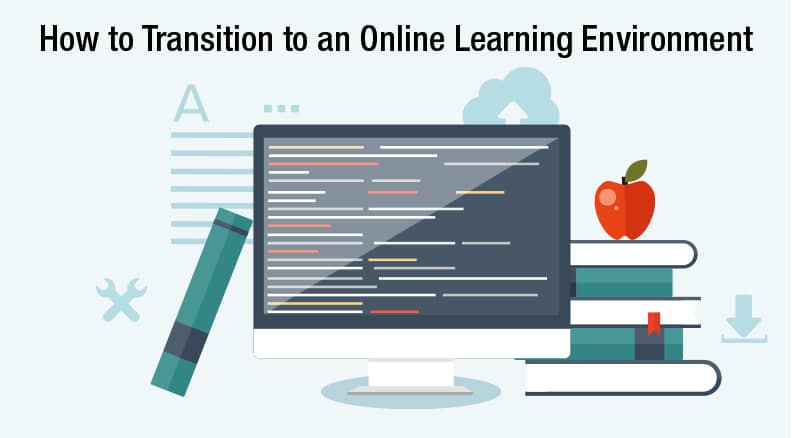
At a time when the nation’s universities and colleges are moving to an online learning environment, AACTE is prepared to support the transition through webinars, resource sharing, and engagement. Next week, technology and online learning experts from the AACTE Innovation and Technology Committee are hosting a 90-minute webinar, Thursday, March 26 from 1:00 – 2:30 p.m. The webinar is open to all AACTE members.
The How to Transition to an Online Learning Environment webinar will address transitioning to online instruction for 30 minutes, followed by a 60-minute Q&A session for members to ask questions of AACTE resident experts. Much like virtual office hours, AACTE members can access our Innovation and Technology Committee members with questions specific to their local context.
The webinar will be recorded and hosted on our resource page for members to access at any time.
Register today.
24 Mar2020
By Lisa Dieker
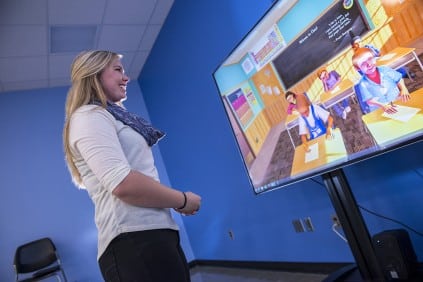
The University of Central Florida (UCF) has moved their work with TeachLivE to remote servers to allow teacher candidates throughout the duration of the COVID-19 Pandemic to use simulations of classrooms to observe student teaching competencies. UCF invites teacher educators from other teacher training institutions to use the TeachLivE platform.
TeachLivE now has the capability to observe student teachers interacting with elementary (option for inclusive setting), middle, and high school (option for inclusive setting) classrooms. Users may request English Language Learning avatars (Spanish).We also support preparation for parent-teacher and teacher-principal conferences. These virtual simulations can occur with an instructor observing a prospective teacher interacting remotely with students in one of the TeachLivE environments or used in an online setting with peers watching each other to provide feedback. The instructor can record data about specific student teaching competencies and providing feedback to the prospective teachers.
23 Mar2020
AACTE Responds to COVID-19
By Deborah Koolbeck
As the United States responds to the COVID-19 pandemic, federal agencies connected to the education and care of our nation’s higher education and PK-12 students are releasing information and guidance for taking action, as well as flexibilities and waivers offered.
The U.S. Department of Education offered a phone call to K-12 stakeholder on Friday March 20, 2020, with officials from the Department, the CDC, and the U.S. Department of Agriculture. The Department has posted a readout of the call, with links to resources on servicing students with disabilities, student loan relief, student privacy, and more.
Main Links for COVID-19 Information
U.S. Department of Education
U.S. Department of Agriculture Food and Nutrition Service
Centers for Disease Control
23 Mar2020
AACTE Responds to COVID-19
By Jane E. West
This blog post is written by AACTE consultant Jane West and is intended to provide updated information. The views expressed in this post do not necessarily reflect the views of AACTE.
Washington Continues to Respond to the Coronavirus Epidemic
The Congress and federal agencies are likewise making changes by the moment. A 50,000 foot overview includes the following.
Legislative activity
- On March 6, Congress passed the first COVID-19 stimulus bill – an $8 billion package to help states and localities address the pandemic.
- On March 18, Congress passed the second COVID-19 relief package, which ensures paid sick leave to certain employees, expands SNAP and Medicaid, and provides emergency assistance.
- Congress is now considering the third COVID-19 relief package, a measure which will total between one and two trillion dollars and may address issues as far reaching as increases in unemployment insurance payments, financial assistance for hospitals and health care providers, a “state stabilization fund,” direct cash payments of $1,200 per qualified person, small business guaranteed loans, and billions in loans for industries, such as airlines. Provisions related to education are also on the menu, as described in the next article.
23 Mar2020
By U.S. Department of Education
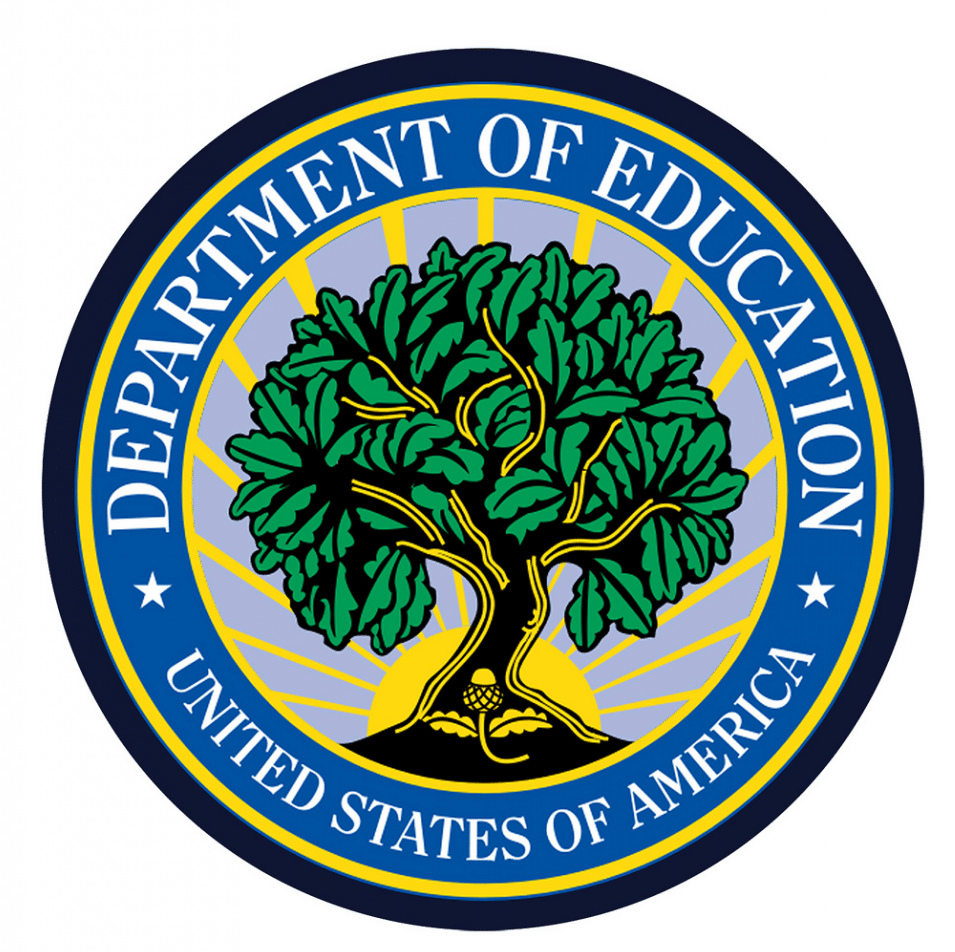 U.S. Secretary of Education Betsy DeVos announced today the Department has released new information clarifying that federal law should not be used to prevent schools from offering distance learning opportunities to all students, including students with disabilities. This new resource from the Office for Civil Rights (OCR) and the Office of Special Education and Rehabilitative Services (OSERS) explains that as a school district takes necessary steps to address the health, safety, and well-being of all its students and staff, educators can use distance learning opportunities to serve all students.
U.S. Secretary of Education Betsy DeVos announced today the Department has released new information clarifying that federal law should not be used to prevent schools from offering distance learning opportunities to all students, including students with disabilities. This new resource from the Office for Civil Rights (OCR) and the Office of Special Education and Rehabilitative Services (OSERS) explains that as a school district takes necessary steps to address the health, safety, and well-being of all its students and staff, educators can use distance learning opportunities to serve all students.
“It was extremely disappointing to hear that some school districts were using information from the Department of Education as an excuse not to educate kids,” said Secretary DeVos. “This is a time for creativity and an opportunity to pursue as much flexibility as possible so that learning continues. It is a time for all of us to pull together to do what’s right for our nation’s students.”
23 Mar2020
AACTE Responds to COVID-19
By Allison Blosser
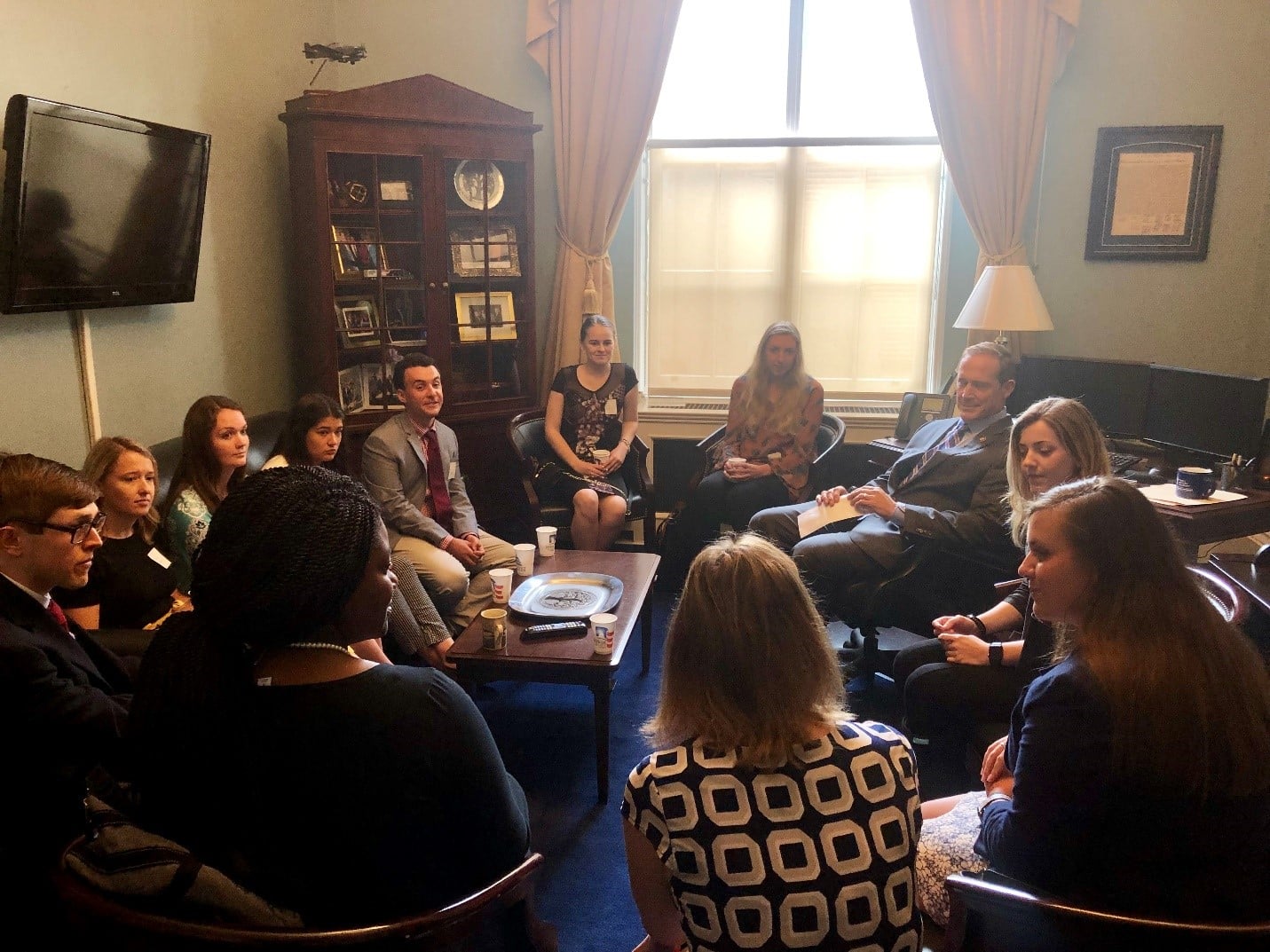
Last May on Capitol Hill, a congressman sat in a corner of his office, while nine of my students, his congressional aide, and I sat in a circle around him. My students, all preservice teachers, shared story-after-story from their classrooms, trying to illustrate how tough it is to be a teacher. With grace and conviction, they explained how in the course of their student teaching, they realized there is still more they need to learn in order to be able to do their jobs well. They looked the Congressman in the eyes and told him that without funding for Title II and a federal commitment to developing them as professionals, they were not sure that they would be equipped to stay in the field, much less teach in the congressional representative’s state, since it’s a state that allocates almost nothing for teacher development.
23 Mar2020
AACTE Responds to COVID-19
By Jennie Carr
Like most of you, I got the email from our president one afternoon last week expressing that our institution was transitioning to remote learning. Instantly, my heart dropped and a zillion thoughts started running through my head. How will I ensure my students get a good experience? What about all my interactive learning experiences? What if my student doesn’t have access to the internet? How am I going to do this?”
After a little reflection, I realized we tell our students not to panic when we assign them a task or assignment that to them seems unforeseeable (the first time they’ve written a 20-page paper or presented for 30 whole minutes). Moving to remote learning may seem unforeseeable to you. However, I urge you to take a breath. Instead of panicking or being irritated, consider an alternative perspective:
This is a chance to try something new. You can take advantage of this unique opportunity. There are dozens of online platforms that have generously offered services for free to support students and faculty during the COVID-19 pandemic. I’ve been desperate to try these platforms but I have not had the time or the financial resources. Personally, I love instructional technology. The past few days I have been like a kid in a candy shop. I cannot wait to explore these pedagogical tools. Consider going back through your emails and pick one to try. Maybe it will rejuvenate you!
20 Mar2020
AACTE Responds to COVID-19
By Ward Cummings
A series of unprecedented events are forcing states across the country to close schools and universities. As school leaders scramble to identify pathways and strategies to protect the health of students and staff, many of them must also attend to the unique challenges of their teaching students who are in limbo because of the coronavirus crisis.
Many states have not yet provided guidance to schools of education on how to lead and advise this special class of students. As a result, many teacher candidates are waiting to learn how, or even if, they will be able to fulfill the requirements of their programs and graduate. Given the unparalleled nature of events, it is understandable if some states are not fully prepared to address this specific concern, but there are a few notable exceptions. In the absence of legislative guidance, states like California, Kentucky, Iowa, and South Carolina have instructively addressed the most pressing concerns pertaining to teacher preparation in their states.
The California Commission on Teacher Credentialing maintains and up-to-date webpage where they attempt to answer the most common questions from educators and employing agencies regarding credentialing requirements, policies, and application procedures. The Commission is particularly concerned about candidates’ ability to complete clinical practice and performance assessment requirements during this academic year, and is looking for ways to mitigate this situation. It has prepared a memo to help guide the decision-making by deans and directors of education on the subject.
17 Mar2020
By Jerrica Thurman

The AACTE 2020 Annual Meeting Opening keynote speaker Robin DiAngelo, associate professor of education at the University of Washington, is widely recognized for her research in critical discourse analysis and whiteness studies. In her address, she explored how to implement strategic, intentional anti-racist actions to interrupt the system of racism in education. Her message aligns with AACTE’s core value of diversity, equity, and inclusion an integral part of AACTE’s strategic plan for 2020-23.
“The status quo of this society is racism; it is not an aberration, it’s the norm. All of our institutions effectively and efficiently reproduce racial inequality and schools are the bellies of the beast,” said DiAngelo. She noted that the concept examining the dominant culture is consistently left off the table in the conversation when discussing race issues. These discussions tend to focus on learning about other racial groups.
During her talk, she emphasized the need to decenter “whiteness” by naming it and exposing it, explaining that there is a white worldview, a white frame of reference that allowed her to move through the world from a white experience. DiAngelo shared, “Being white, I was not raised to see myself in racial terms” She reasoned that as a white person, “when we talk about race it’s about their race not mine.” She acknowledged the complexities of racism and the inability to understand every nuance. “But it’s on me to get that information, not on people of color to hand it to us.”
17 Mar2020
By Timara Davis and Sacha Cartegena

The national teacher shortage has required all stakeholders to take action. What do we know and what can we do? The Annual Meeting “Addressing the Teacher Shortage” Deeper Dive session brought together a panel of experts to discuss the alarming data on and present strategies to combat this epidemic. The panel consisted of AACTE consultants Jacqueline King and Jane West; Zeke Perez, policy analyst, Education Commission of the States; and AACTE board member Marquita Grenot-Scheyer from the Office of the Chancellor at the California State University System.
Jacqueline Rodriguez, vice president, program and professional learning at AACTE, served as the moderator. She began the session by providing a national overview as it relates to the teacher shortage by highlighting, “As a Nation, we have …
- A decline in enrollment in teacher preparation programs;
- Significant lack of diversity in our educators: race, ethnicity, gender, identity, disability;
- High poverty schools which experience disproportionate teacher shortages;
- Schools with high enrollment of students of color more likely to employ uncertified teachers; and
- Teacher turnover at a significant high financial cost.
16 Mar2020
AACTE Responds to COVID-19
By Jane E. West

This blog post is written by AACTE consultant Jane West and is intended to provide updated information. The views expressed in this post do not necessarily reflect the views of AACTE.
Congress is working to respond to the pandemic on multiple levels. To date seven members of Congress have announced that they have been exposed to someone with COVID-19 and are self-quarantining. A staff member of Sen. Maria Cantwell (D-WA) has tested positive for the virus and Sen. Cantwell has closed her office. The U.S. Capitol has ceased public tours, both those member and staff led. The Capitol complex, including House and Senate office buildings, is restricted to official business only. Rep. Dean Phillips (D-MN) noted “We should encourage people to not travel here right now.” Washington, DC Mayor Muriel Bowser has declared the District a state of emergency and limited gatherings. Likewise, the Governors of Maryland and Virginia have declared states of emergency and limited gatherings.
16 Mar2020
By AACTE
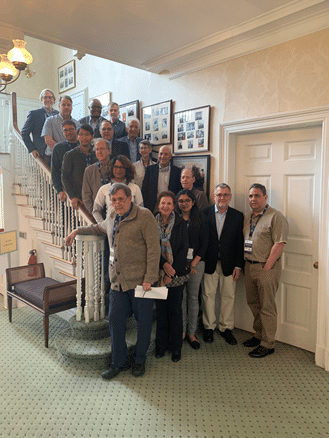 An excerpt from this article appeared in District Administration on March 11.
An excerpt from this article appeared in District Administration on March 11.
Today, we live in a society where truth is decaying, falsehoods are readily shared across social media, and hatred and discrimination are on the rise. According to the Southern Poverty Law Center the number of hate groups operating in the United States hit a record high in 2018. Hate speech creates an environment in which biases and discrimination thrive and can have a detrimental impact on a school’s culture and climate. Teaching and learning about the roots of hate are important elements in fostering an inclusive classroom environment.
Teachers play an essential role in creating a more humane and tolerant world. They are stewards of culture and are in a position to protect history, promote facts and prevent inhumanity. However, to provide students with the most effective instruction, educators must have the tools to understand the nature of hate crimes and how they impact the culture and climate of schools where they teach. Additionally, they must know how to address issues of bias and discrimination in the classroom.
13 Mar2020
AACTE Responds to COVID-19
By Lynn M. Gangone
AACTE has been closely monitoring information on the coronavirus (COVID-19) and is deeply concerned about the safety and well-being of the faculty, staff, and students within Colleges of Education. AACTE stands ready to support the educator preparation community as we all cope with this global crisis.
We have received notifications that some universities are transitioning classes to an online platform while others have canceled all classes for the remaining semester to ensure the safety of their students. We realize that this will impact clinical practice requirements and other criteria teacher candidates must complete for graduation. This is indeed a challenging time.
12 Mar2020
AACTE Responds to COVID-19
By Deborah Koolbeck
The U.S. Department of Education (Department) released guidance on March 5 and followed up with additional outreach on March 11, 2020 to ensure that institutions of higher education (IHE) are aware of options for various interrupted study due to COVID-19, including what the Department refers to as “student teaching.” This is particularly important for compliance with Title IV of the Higher Education Act. The guidance covers five scenarios including the following:
“A student was enrolled in a program and met the requirements for full-time enrollment; however, due to the COVID-19, one or more classes—such as an internship, a clinical rotation, student teaching or fieldwork—have been cancelled and now the student has fallen below the 12 credit hour minimum and is no longer considered to be a full-time student …”
Please review the guidance offered and work with your institution’s leadership, including the financial aid office moving forward. Specific situations leading to additional questions should be directed to COVID-19@ed.gov.
Other resources
U.S. Department of Education COVID-19 Resources
CDC Interim Guidance for Administrators of US Institutions of Higher Education
CDC Coronavirus 2019 (COVID-19) Fact Sheet
11 Mar2020
By Glenn Gillen

WGU North Carolina, an affiliate of the national online Western Governors University, has signed an agreement with Rowan-Salisbury School System (RSS) to help classified staff, such as teacher assistants, advance their careers by earning bachelor’s degrees and teacher certifications.
Any Rowan-Salisbury School System teacher assistant who enrolls in one of WGU North Carolina’s teacher-preparation programs will receive up to $800 in tuition credit per six-month term, after any Pell Grants have been exhausted, for up to 3 years. RSS employees will also receive an application-fee waiver code.
Additionally, WGU North Carolina will create a unique URL for RSS employees and promote this opportunity through printed materials, social media, on-site presentations and other channels. Employees will also have access to WGU career services resources and events, and WGU NC staff will be available to participate in any education/benefits fairs, seminars, and “lunch and learn” presentations offered by Rowan-Salisbury Schools.




 U.S. Secretary of Education Betsy DeVos announced today the Department has released
U.S. Secretary of Education Betsy DeVos announced today the Department has released 



 An excerpt from this article appeared in
An excerpt from this article appeared in 